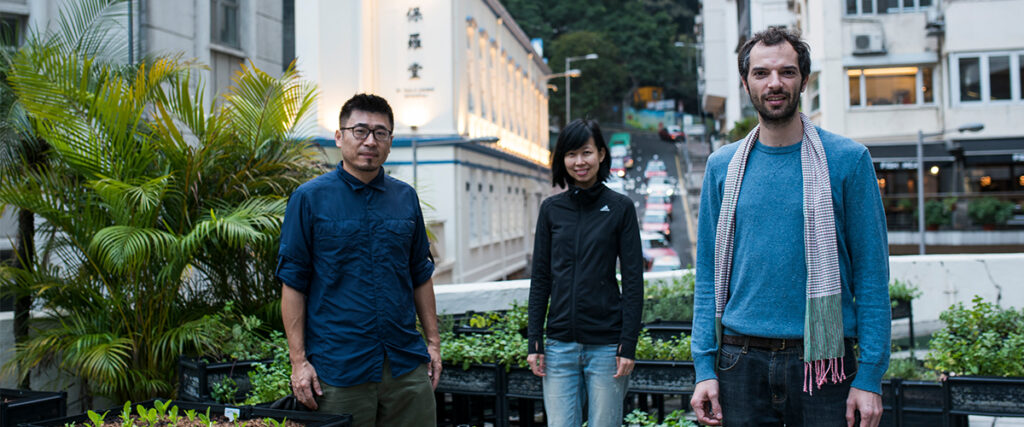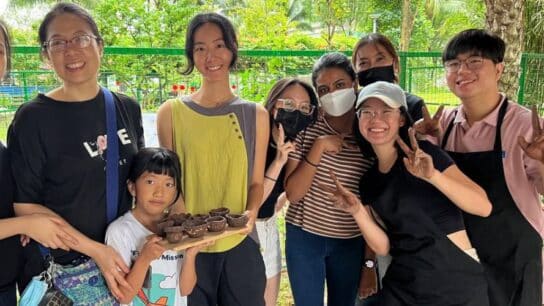Hong Kong’s skyline is turning green thanks to the rooftop farm. We speak with Andrew Tsui, co-founder of Rooftop Republic, to find out why.
Growing local produce, especially in a densely populated place like Hong Kong, is no easy feat, thanks mostly to a severe lack of space. However, for Andrew Tsui, a small thing like that shouldn’t stand in the way of his city’s green future. Determined to counter this problem, he began thinking about his social enterprise Rooftop Republic five years ago, with plans to design, build and raise awareness of urban farms across Hong Kong’s skyline. Pioneers in this fast-growing field, the company has now designed over 40 urban farms across the rooftops of Hong Kong, including The Bank of America Tower, East Hotel of Tai Koo Shing and the Manulife Financial Centre. He sat down with us to talk about why, for him, the future’s up in the sky.
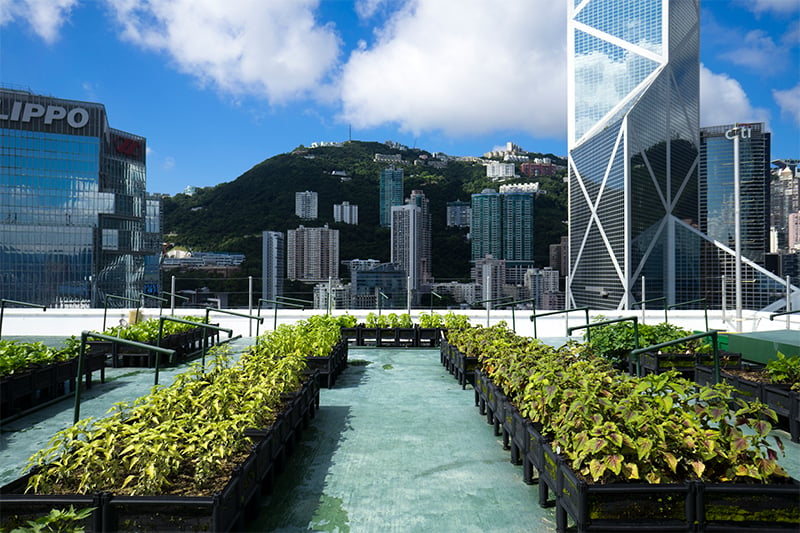
Stepping out onto the level five rooftop Sky Garden of the shopping and office complex Metroplaza in Kowloon’s Kwai Fong, one sees immediately that the entire place is covered in green. Fresh and mouth-watering fruit and vegetables can all be found growing on the skyscraper’s rooftop farm allotment, from mint to cucumbers, bok choy to mustard leaf and even tomatoes. With butterflies and bees also attracted to the scene, it sets a striking contrast to the urban jungle that hums far below it. For Andrew Tsui, it also sets the scene for the future.
Raised in Hong Kong, Andrew officially co-founded Rooftop Republic three years ago alongside Pol Fabrega and Michelle Hong. The company designs, manages and builds urban farms for property companies, individuals and restaurants up on their roofs in Hong Kong as well as holding workshops and educational events to spread awareness of their cause. With projects ranging from small, allotment style spaces growing fruit and veg to large scale, landscaped oases, they are at the heart of one of the city’s most compelling currents of change.
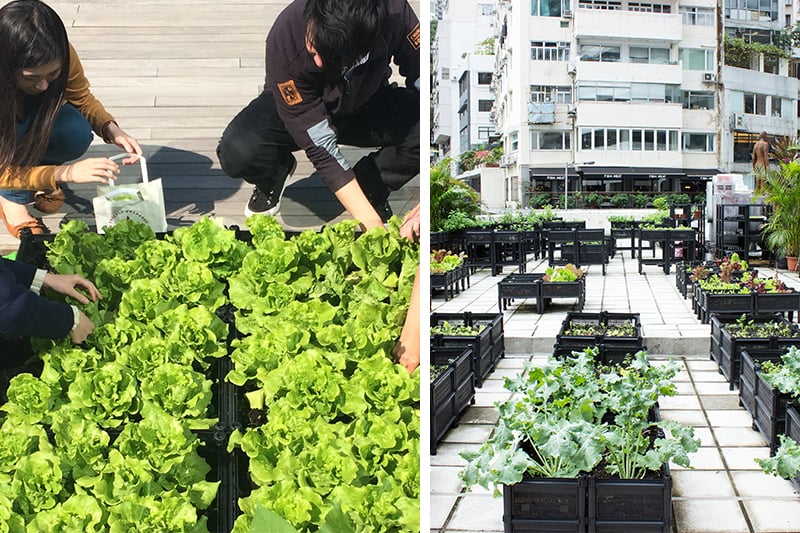
Though he was never an avid environmentalist in his youth, a stint working in asset management in China made Andrew realise that capital investment could have a huge impact on the way people live in society as well as shape its future. Galvanised to start reading into social entrepreneurship and sustainable development, he found himself focused on green building, green urban development, and soon urban farming. “It’s fantastic because, not only can you put some greenery into urban spaces, you can also have some form of productivity,” he explains. Andrew’s background may not be that of your typical green entrepreneur, with a B.Eng. in Civil Engineering from the University of Singapore, and later an executive MBA from The Chinese University of Hong Kong, however, he credits it with standing him in good stead. “My basic degree as a Civil Engineer helped me tremendously with the majority of work I do now, such as looking at construction drawings, talking to architects and designers,” he recalls. “So, in a sense, everything adds up. Of course, I don’t do it alone, I have a great team.”
The issues that Andrew and his team are trying to address come in many guises – some practical, others environmental, societal or even emotional. First up, they’re providing spaces in which people can grow decent organic produce in a more accessible and sustainable way. “Think about what’s inside our refrigerators,” he says. “If we open them up, what percentage of local produce or handmade items do we see? We don’t have to go very far to see how unsustainable the industrialised food system is.” In this vein, Rooftop Republic is working closely with the city’s F and B industry. Head to the Fringe Club for dinner, and you may easily find yourself eating an aubergine entrée or delicious salad grown on the restaurant’s own rooftop farm.
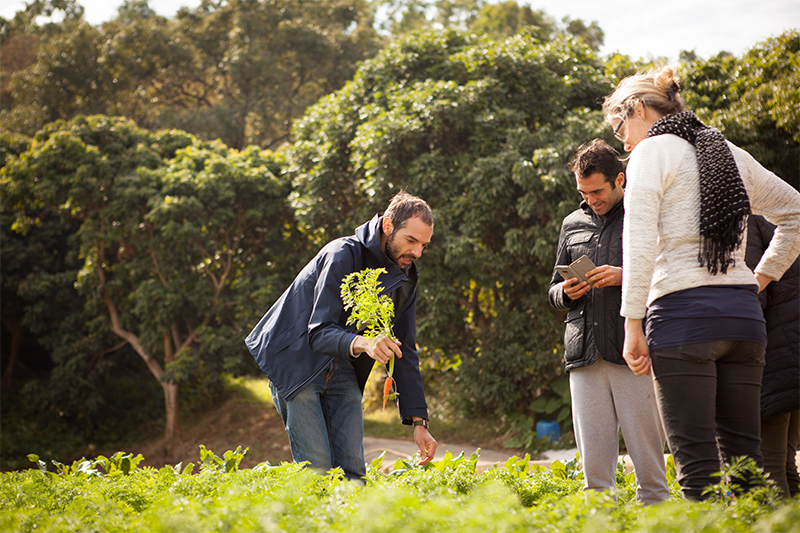
Beyond that, they also have an eye on addressing much-needed changes in the city’s community life. “Agriculture in the West sees productivity in terms of yield on the farm, however, ours is the opposite,” he explains. “For us, yield is based on the community and getting others involved.” In his eyes, transforming urban spaces into edible gardens is not something that can be achieved alone. Instead, they need to create an ecosystem that reconnects city-dwellers with the basics of food. “By getting to know the food producers and processors, we can then create a lasting change of behaviour,” he stresses.
Another great plus of urban farming as Andrew sees it, is that it brings people together. As he says, with the advent of high-rise buildings, space becomes more compartmentalised. Think of office cubicles, little, individual rooms that cut people off from each other. And then, there’s another creeping kind of compartmentalisation to be found in digital media, especially on your smartphone. “You are physically here, but your mind is within the little screen. So, people end up not interacting, even when they’re in the same room,” says Andrew. The amazing thing for him is how a farm negates all that. “I term a farm a relational space. When people come in, they naturally put down their agenda and have a meaningful conversation, rather than just talking about work. A farm helps to create the opportunity for people to discover different facets of others they might relate to, which helps the community building process.”
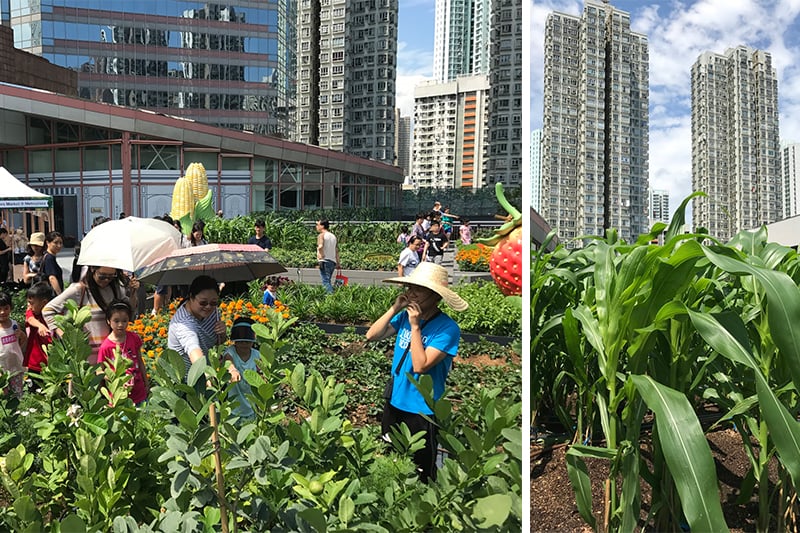
According to Andrew, corporations like PricewaterhouseCoopers are already seeing improvements thanks to this. Those who have transformed their rooftop spaces are seeing staff members bring their lunches to these gardens, which improves productivity. This is backed up by research. A recent study from Harvard found that working in ‘green’ offices boosts cognition levels by 26%, whilst another study from Exeter University discovered a 15% boost in employee productivity. As urban farming gains traction, as Andrew explains, “The biophilia hypothesis suggests that humans have an innate tendency to seek out nature. As it has so much positive impact, especially psychologically, people love it.” Ultimately, as Andrew puts it, “these are things money can’t buy.”
In five year’s time, Andrew hopes to see Rooftop Republic expand to other Asian cities, such as Vietnam, Thailand, Singapore and Shanghai. When asked if he had any advice for people interested in urban agriculture starting their own rooftop farm, he advises “Reaching out is good. You can learn from other people’s mistakes. Other than that, get your hands dirty and start!” With endless benefits in all areas, it’s a compelling call to action.
Feature image by Xaume Olleros
Image 1 and 2 by Sarah Thrower
